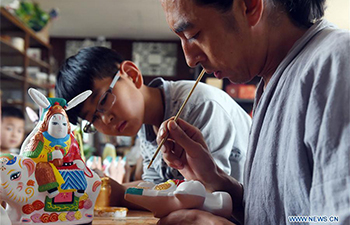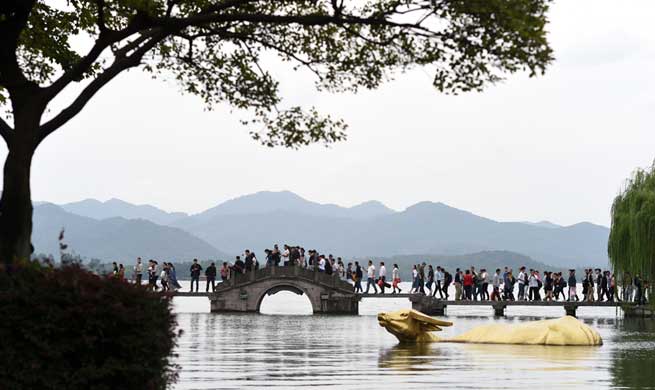ANKARA, Oct. 4 (Xinhua) -- The Turkish government abruptly decided to abolish the exam system for high school admission half a month ago, a move which has brought relief to stressed students and parents but also caused new confusion about the future of the national education system.
On Sept. 19, Turkish President Recep Tayyip Erdogan declared during a television interview that Turkey will no longer implement the Transition from Primary to Secondary Education (TEOG) exam and the university entrance system is also under review.
"Parents are very unhappy with these exams," he said.
A day later, Education Minister Ismet Yilmaz officially announced the cancellation of TEOG because, he said, it treats students as "racehorses."
During the weekend, the minister announced an alternative plan where students will go to high school on the basis of their overall grades in junior high school and a less integrated exam system. Some highly-praised schools would have to install their own entrance exams.
The new move concerns 1.3 million junior high students and 3 million university candidates in a country with 12-year compulsory education.
In the residential Yildizevler district of the capital Ankara, Xinhua interviewed several parents about the new enrollment system in two different public schools.
"I think it's a very good decision. This exam (TEOG) was a horrible challenge for both parents and students because when you were not successful you couldn't go to the school you want," said Hulya Mutlu, a mother of two.
"Now grades will also count and the exam will take place in the student's school instead of a designated place, so our kids will be less stressed," she added.
But Kevser Atli, whose daughter will go to high school during this school year, concerned herself about the workings of the new system.
"I'm happy for my child but confused on how the new system will work. The education system has become something very difficult to understand," she said.
The TEOG system was introduced in 2013 amid criticisms from education experts and opposition parties. A total of 1.3 million students were competing for fewer than 400,000 slots in public high schools, according to official data.
The Turkish government has said radical changes will also be made to university's entrance exams by scrapping the long-running centralized exam system.
The government's decisions add to the controversy on recent curriculum changes which highlight more religious substance.
Amid concerns that their children could be placed in religious or imam-hatip schools if they perform poorly in the exams, many Turkish families have turned to private instructors or special schools in order to secure a place in a credible high school for their children.
The tendency of many families to send their children to private colleges in order to escape mandatory placements in religion-focused schools has led to a huge rise in the number of private school students.
Parents who cannot afford private colleges are seeking other ways, such as registering their children at public high schools instead of imam-hatips.
Hailing the government's decision to abolish the old exam system, experts say the government must also focus on quality in Turkey's education system.
In a recent report on Turkey's education, the Organization for Economic Cooperation and Development (OECD) drew a grim picture.
Turkey has the second lowest cumulative education expenditure per student among OECD members and is trailing behind in education system quality, ranking 101th among 137 countries, the report said.
"I am saddened by the fact that we have not reached the level we desire in two areas. One is culture; the other is education," Erdogan said last month.
Kemal Kilicdaroglu, leader of the main opposition Republican People's Party (CHP), criticized that the ruling Justice and Development Party has changed six education ministers and each of them introduced a different system.
"The majority are happy that TEOG will not be applied, but we think it's only the tip of the iceberg. Our education system lacks quality despite serious efforts," Burcu Meltem Arik, an expert from the Istanbul-based Education Reform Initiative, told Xinhua.
The expert called on the government to narrow regional disparities in school quality, "which is very detrimental and unfair to children, but also to the Turkish society as a whole."
The need for a broader consensus on pedagogical issues is also a must, she said.
"We definitely need more consensus and dialogue between relevant institutions and organizations in decision making. We have to understand that tests or exams don't make a good student, but to acquire and assimilate knowledge," Arik noted.

















